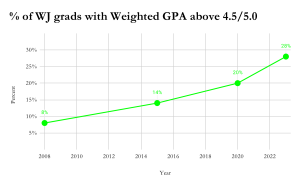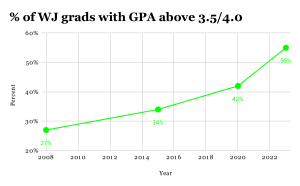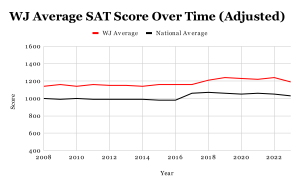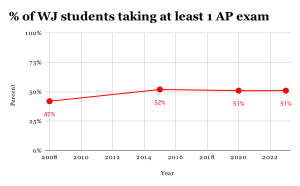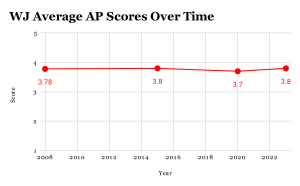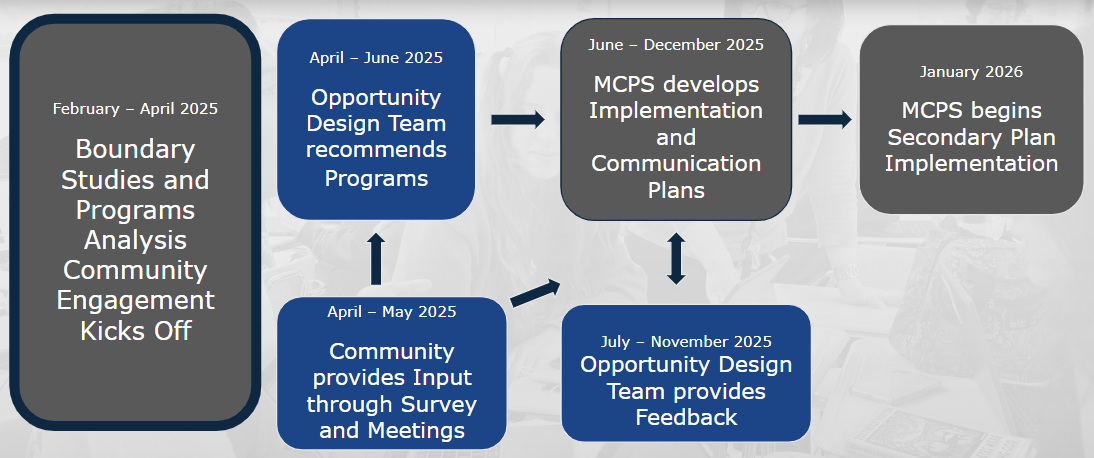In the 15 years between 2008 and 2023, the number of WJ students graduating with an A average has doubled. In 2023, 58% of WJ graduates had a Weighted Grade Point Average (WGPA) of at least 4.0 out of 5.0. In 2015, that number was 44% and in 2008, just 29%.
Yet, in the same time frame, other measures of academic performance, like SAT and AP scores, remained relatively flat. In 2008, the average WJ student scored 3.78 out of 5 on an AP exam. In 2023, the average score had barely budged, sitting at 3.80. The average SAT score for a WJ student in the same timeframe increased 4.5% from 1140 (adjusted to the 1600 scale) in 2008 to 1190 in 2023.
Between 2008 and 2023, MCPS saw three major shifts in its grading policy that could point to the root cause of the phenomenon of grade inflation: eliminating finals, changing class registration and adopting post-Covid grading culture.
Data via WJ School Profile (via Internet Archive), MCPS Office of Shared Accountability and Prep Scholar.
2016-2017 grading changes eliminate finals, introduce semester rounding

Between 2008 and 2015, scores and GPAs slowly but steadily increased — the proportion of GPAs above 3.5 increased from 27% to 34%, while SAT averages increased from 1140 to 1160. Then, in the fall of 2015, MCPS announced that starting in the 2016-2017 school year, they would be ditching final exams, the two-hour tests that used to be at the end of most academic courses, counting for 25% of students’ grades.
During finals week, students would have no more than two tests per day, and did not come to class other than to take their tests. While the finals took away from instruction time, they also gave teachers more time for end-of-quarter grading and planning.
“Nobody likes exams. But, it was nice because you had an entire week where you were treated like an adult as a kid,” long-time social studies teacher Mitchell Joy said. “The staff, we also had a chance to set up for the next semester. [Now,] we have one day. It’s a lot of work for one day.”
As a part of the grading overhaul that saw finals axed, MCPS also changed the way semester grades are calculated. Whereas previously, the district would calculate semester grades on a “downward trend” system (MP1 A and MP2 B = Semester B), starting in 2016-17, the two quarter grades were averaged to calculate the semester grade with a generous rounding policy.
With the new policy, a student receiving an A in the first marking period and a B in the second would have an A average for the semester. In the most extreme hypothetical, therefore, an 89.5% and a 79.5%, which round up to A’s and B’s, respectively, would give a student an A average for the semester. At the time, the district said that the quality point average system “aligns with standards-based approaches to assessment and college expectations” and would be “fair, consistent, and understandable.”

However, this change has led to some students “gaming the system,” taking advantage of the rules about rounding.
“I absolutely find myself trying hard for a good grade first quarter and taking it easier second quarter,” junior Brian Mouyard said. “A lot of my friends do the same thing. They just don’t care if they already have a good grade.”
In addition, sometime around or before 2019, MCPS also started putting more emphasis on enrolling students in honors classes in an attempt to bring parity and equity to class registration. In a fall 2019 article, the Washington Post reported that many on-level classes were disappearing across MCPS.
Today, while MCPS continues to list it on their official high school course bulletin, most high schools, including WJ, do not offer on-level English as an option (according to their own course bulletins). Instead, students are automatically enrolled in either an honors or AP English course or an English Language Development program course. At WJ, Honors Health is the default health course, and at many other schools in the county, on-level biology is no longer being offered.
This effort has, therefore, caused suspicion over the ballooning Weighted Grade Point Averages, which award an extra point for Honors, AP and IB classes. While MCPS awards the extra 1.0 points for both honors and AP classes, in other neighboring school districts like Fairfax County, Prince George’s County, Frederick County and Anne Arundel County Public Schools, honors classes are only worth an extra 0.5 points in calculating WGPA.
However, the district’s practice of awarding a full extra quality point for honors classes has been in place since at least 2003.
“The problem is that people get upset because their grades don’t equate what they get on AP exams or don’t equate how they do in college because it’s unrealistic,” Joy said.
Covid grading standards leave residual effects
While the 2017 grading changes led to grade inflation, as even MCPS admits, the most commonly cited reason today for grade inflation ties back to the Covid-19 pandemic. At the start of Covid, MCPS temporarily shifted to a pass/no pass grading system for secondary students in the fourth quarter of the 2019-2020 school year. While MCPS shifted back to the traditional A-E scale in the fall of 2020, they encouraged “leniency” from teachers in grading and made adjustments to the grading policy to reflect the relaxed standards.
For example, the “50% rule,” first introduced in 2006, was updated, requiring teachers to give 50% on assignments even if students made no attempt at completing the assignment. Previously, the policy had allowed teachers to assign 0s for assignments that showed a lack of student effort. MCPS told teachers to “err on the side of issuing a 50%” and required communication with a student’s parents before assigning a zero.
“The idea that you didn’t do the work and you can make it up and get full credit just like the person who did it on time, that’s very irritating and just seems unfair,” Joy said.
MCPS has since walked back that policy and teachers are again allowed to assign zeros for work that lacks student effort; however, the core of the 50% rule remains in place for all extents and purposes. The residual effect of Covid-era grading and leniency remains in grading, which students note makes it much easier to pass classes and has changed the attitude around taking classes seriously.
“You have to try to fail,” senior Addison Pollitt said. “Since Covid, you can retake anything, and it’s like, ‘I don’t have to do well the first time because I can retake it the second time.”
Many of the smaller grading policies about retakes, redos and turning in late assignments have remained in place from Covid. For example, in theory, assignments submitted after the deadline should receive zeros, according to MCPS’s regulation IKA-RA, Grading and Reporting and the Student Guide to Rights and Responsibilities published by the county and was standard practice pre-Covid. However, teacher guidance today continues to mandate that teachers accept work past the deadline for half credit, following the 50% rule.
“I think I have become more flexible with students [post-Covid], which I think is fine, but up to a point,” Joy said. “I try having fun in class, but also, I also try to hold people accountable to whatever they hand in to me because I think that’s the only way they’re going to have any experience that mimics a college experience.”
The future of MCPS’s grading policy
The biggest concerns with the grading policy are that it does not accurately reflect the performance of MCPS students and that it does not adequately prepare high school students for the reality of college grading.
“Our students need to be accurately assessed and measured in their progress towards meeting standards. We cannot assess how our students are learning unless we use authentic data,” District 2 Board member and former teacher Natalie Zimmerman said in a candidate questionnaire posted on the blog Moco Perspective prior to her election in November.
Senior Kansiri Sukduang took Spanish 101 and International Relations as a dual enrollment student at Montgomery College and saw the difference between MCPS and a college-level grading system.
“There have been times I realized like, ‘Oh sh*t, I’m going to fail a class’ because MCPS policies don’t apply. I can score below 50%, and I can be assigned zeros,” Sukduang said. “I wasn’t the only high schooler taking the course, and my professor was like, ‘You guys have to remember there is no 10% late policy. If you turn it in late, you can, and you will get a zero.’”
As a part of MCPS Superintendent Dr. Thomas Taylor’s entry plan, Taylor identified the grading policy as one part of the “Academics” feedback in his community engagement.

Taylor noted that in Phase II of his three-phase entry plan (Engagement, Evaluation, Empowerment), the district would need to look at the grading policy to “ensure fairness, consistency, and alignment with educational standards” and noted that the current policies have been criticized for “not accurately reflecting student mastery and fostering counterproductive behavior.”
However, what this change may look like is unknown. Potential changes could include reinstating finals, tweaking the semester grading policies or ditching the 50% rule entirely.
At-large Board member Rita Montoya remarked in November that the current grade policy “does not provide an accurate representation of the student’s knowledge of the subject matter,” while District 4 member Laura Stewart went as far as to support bringing back semester exams for certain classes.
However, some remain skeptical that real change can happen with the expected public outcry.
“Nothing is going to actually change because if it does, people are just going to complain about it,” Pollitt said.









